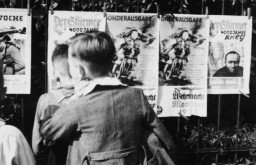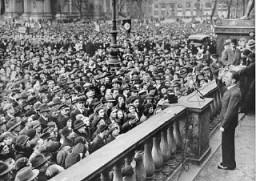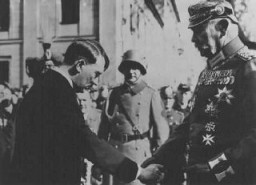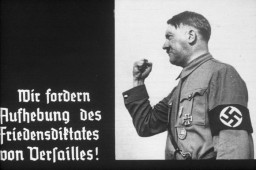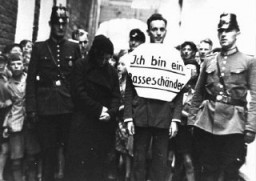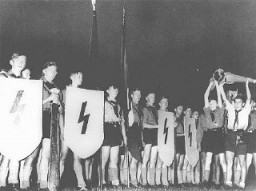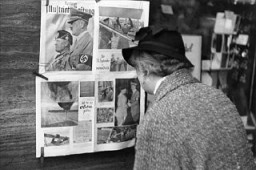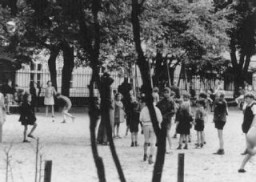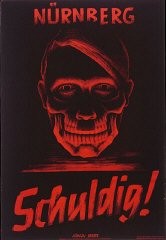Rallying the Nation
German Government in Crisis
From 1919 to 1932, a series of coalition governments ruled Germany, a period of German history known as the Weimar Republic. During this time, no single political party was ever able to establish a parliamentary majority.
Disagreements over economic policies, as well as the growing political polarization between the parties on the Left and the Right, prevented the formation of a workable coalition. Instead, after June 1930, a succession of chancellors abandoned the search for a working parliamentary majority. Manipulating emergency legislation in the German constitution (Article 48), which had been established by German politicians to preserve democracy in times of unrest, they governed by presidential decree without parliamentary consent. This governing structure stabilized the economy and the parliamentary system, and also temporarily quieted street violence.
The Nazi Myth
In this time of instability, the Nazi Party emerged from relative obscurity to national prominence. The Nazi Party dramatically increased its public support by advertising itself as a protest movement against the corruption and ineffectiveness of the Weimar “system.” It decried the Weimar Republic as a morass of instability and inaction, defined by the humiliation and desolation of the defeat in World War I and the punitive terms of the postwar Treaty of Versailles.
Nazi propagandists promoted the party as Germany's only all-encompassing movement that spoke for all non-Jewish Germans, regardless of class, religion, or region. All other political parties, in Nazi eyes, were special interest groups devoted to narrow self-interest. Nazi propagandists also appealed to popular desires for order after a period of violent civil unrest. Pledging to unite Germany, put the nation's six million unemployed back to work, and restore “traditional German values,” Hitler garnered massive popular support.
The Allure of Joining a Mass Movement
A cornerstone of Nazi ideology and propaganda was the creation of a “national community” (Volksgemeinschaft), a racial union of all “Aryan” Germans that would transcend class, religious, and regional differences. The political conflict and social strife that characterized parliamentary democracy in the preceding Weimar period had no place in the new National Socialist society. In contrast to the protection of personal rights enshrined in the Weimar constitution of the preceding years, Nazi propagandists placed the general welfare of the national community before concern for the individual.
All “racially pure” Germans, identified as “National comrades” (Volksgenossen), were obliged to aid those who were less well off and sacrifice time, wages, and even their lives for the commonweal. In theory, neither lowly birth nor modest economic circumstances would be hindrances to social, military, or political advancement. Nazi propaganda played a crucial role in selling the myth of the “national community” to Germans who longed for unity, national pride and greatness, and a break with the rigid social stratification of the past. In this way, propaganda helped prepare the German public for a future defined by National Socialist ideology.
Preparing the Population for War
Wartime propagandists often seek to justify the use of military force by portraying it as morally defensible and necessary. In summer 1939, as Hitler finalized his plans for the invasion of Poland, the public mood in Germany was tense and fearful. No crowds lined the streets calling for war, as they had done at the outbreak of World War I in 1914. The specter of that war and the deaths of two million German soldiers haunted popular memory. The Nazi propaganda machine was tasked with building public support for a new war.
Throughout World War II, Nazi propagandists disguised military aggression aimed at territorial conquest as acts of ethnic self-defense necessary for the survival of “Aryan civilization.” They portrayed Germany as a victim or potential victim of foreign aggressors, as a peace-loving nation forced to take up arms to ensure the security of the German people, or to defend Europe against Communism.
Despite the advance of British and US troops in the West and the Soviet advance in the East in the late summer of 1944, the Nazi leadership refused to capitulate and urged the population to fight on in a suicidal attempt to stave off the inevitable. Nazi propagandists held out the threat of annihilation of German life and culture at the hands of “Jewish Bolshevism” if the Allies won the war. They unrealistically guaranteed victory through miracle weapons or the sheer willpower of the Führer and the German people. Faced with defeat, Hitler's regime responded with increased terror and with propaganda aimed at inspiring fanaticism.
Critical Thinking Questions
- How can knowledge of the events in Germany and Europe before the Nazis came to power help citizens today respond to threats of genocide and mass atrocity in the world?
- Is there a direct link between words and actions? Can words and images inspire people to commit acts of genocide?
